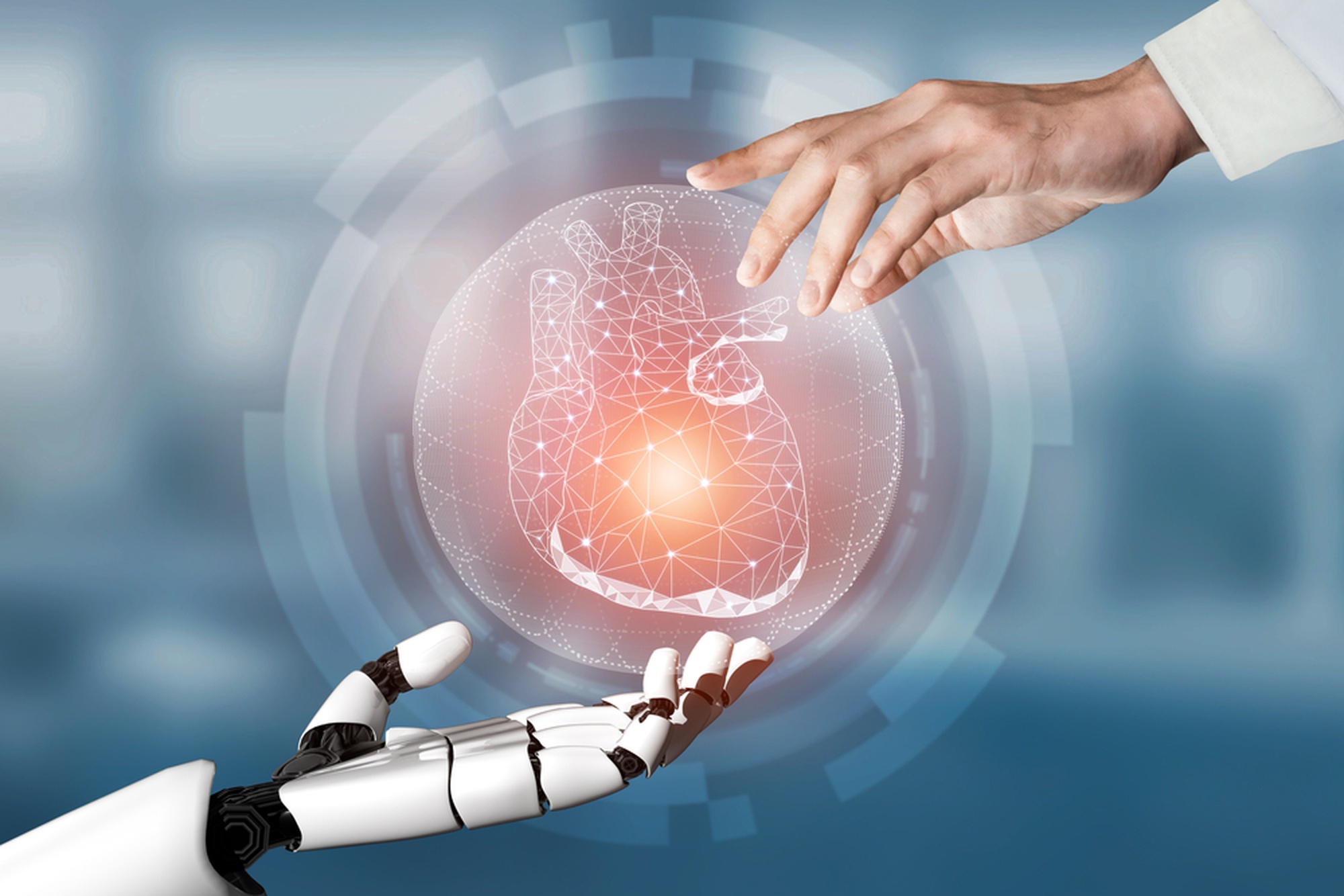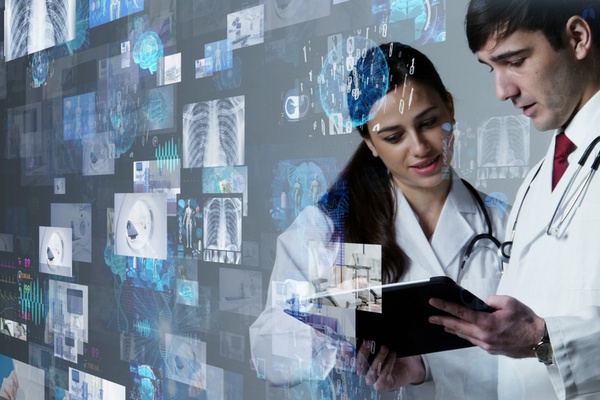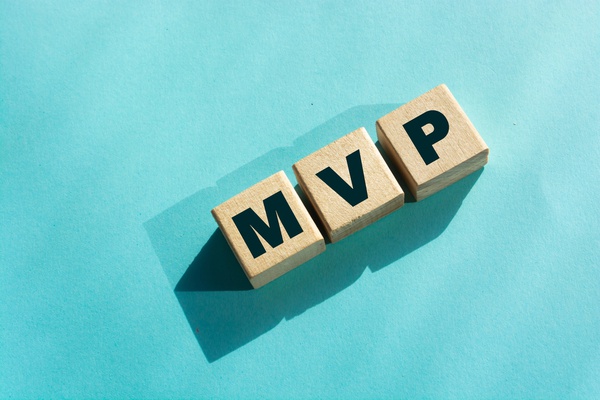Machine learning has the potential to disrupt the medical industry by opening up new ways to handle healthcare data, transforming patient care, and streamlining administrative processes. Terabits of medical records, which previously required a human reading, can now be used as input data for machine learning in healthcare projects.
Simply put, machine learning (ML) is a subset of artificial intelligence (AI) that focuses on using algorithms to learn from the data without the need for further programming. Thanks to its ability to learn from experience and adjust to new inputs, ML can perform human-like tasks.
Read also: Why Artificial Intelligence Won’t Replace Doctors
Being an expert in healthcare software development, Demigos is perfectly placed to shed some light on the current state of machine learning in the medical field, its most promising use cases, and the challenges hindering the wide adoption of ML.
Let’s start.
Machine learning in healthcare: A market overview

ML is mostly based on artificial self-learning neural networks that can help put into action what the healthcare sector has in spades—tremendous and rapidly growing pools of data. Global investment in artificial intelligence in healthcare hit a new high during the first quarter of 2021, reaching a record-breaking $2.5 billion. And it’s no wonder because the number of successful startups using machine learning to foster innovations in the medical field is growing at an unprecedented speed.
Public healthcare establishments do not trail far behind either. Last year, an IDC study among US, UK, and German hospitals showed that 50% of them already have an AI framework to support their organization. The remaining respondents planned to adopt AI/ML within the next two years.
Another survey conducted by Statista among US healthcare providers indicated 22% of their respondents to be in the early stage of ML initiatives, while nearly a quarter of respondents (24%) already have AI/ML efforts in their healthcare systems in the pilot stage with further rollout to be decided.
Why are medical organizations striving to adopt machine learning? ML technology has the potential to become a real game-changer in many areas of healthcare. To give you an example, MIT’s Computer Science and Artificial Intelligence Lab has created a new deep learning-based prediction model. The model can forecast the development of breast cancer up to five years in advance. Trained on mammograms and patient follow-up data, their ML algorithm identifies patterns not obvious or even observable by human clinicians.
But that’s only one of many ways how using machine learning in the healthcare system can positively impact medical practice. There are a lot more. So, let’s give them a closer look.
Machine learning applications in healthcare
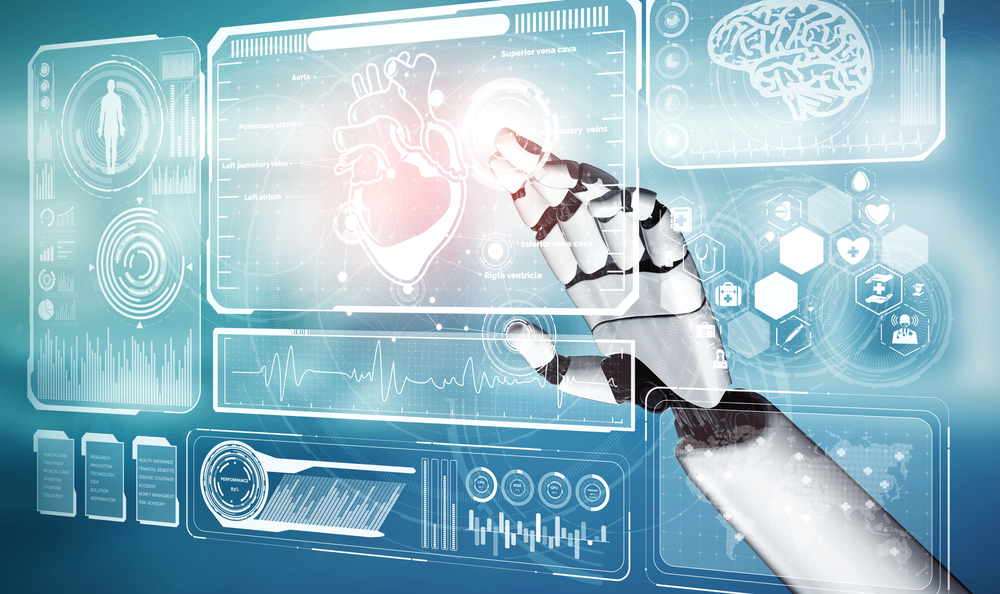
ML has the power to make extraordinary improvements to the healthcare system thanks to reducing subjectivity and variability in clinical diagnosis. It has already shown promising results in helping clinicians diagnose cancer, tumors, rare diseases, and pathologies. ML-based systems can even outperform humans in certain tasks.
Let’s look at the top ten applications of machine learning in healthcare that can bring substantial benefits for patients and healthcare providers.
Diagnosis identification
As many as a third of all healthcare AI SaaS companies are focusing on diagnostics, partly or exclusively. With the ability to analyze data belonging to tens of thousands of past patients in seconds, machine learning can aid clinicians to correctly identify diseases and increase the quality of treatment. What’s more, ML can also analyze additional data on a patient’s condition, like their previous CT scans, tests, and screenings or their relative’s chronic conditions to help doctors make a correct diagnosis and enable better care.
A prominent example of machine learning applications in healthcare is Eko. Based on proprietary sensors and machine learning algorithms, it outperforms human physicians at detecting heart problems. Eko showed 99% accuracy in detecting atrial fibrillation compared to the 70-80% accuracy of general practitioners. As a result, patients can receive proper treatment faster, which can sometimes be lifesaving.
Medical image analysis
Historically, radiologists devoted much time to painstakingly studying CT images to identify anomalies like cancer tumors or growing embolisms. But deep learning, which is a more advanced subset of ML, has the potential to change this.
Deep learning in healthcare takes medical image analysis to the next level by enabling CT scans to be compared to hundreds of thousands of similar cases in the database and identify cells damaging the organism (like cancer cells) in a trice. It can then alert a doctor of anomalies found and even flag possible diagnoses, saving clinicians’ time in the review process.
For instance, Arterys, a cloud-based medical imaging platform, uses machine learning algorithms to create and compare pictures of blood flow. Thanks to this platform, cardiac analysis time can be cut from 40 to only six minutes.
Medical record management
Record keeping eats up a significant part of any physician’s time. But using ML in healthcare can solve this issue. Along with natural language processing (NLP), which is another subset of AI, it can free physicians from many routine tasks. For instance, NLP algorithms can capture human dialogs during a patient's visit and transform them into text, so doctors no longer need to manually enter clinical notes.
Besides, using NLP and optical character recognition (OCR) techniques can help unlock valuable unstructured data from EHR, allowing physicians to use this information for decision-making and analytics. What’s more, these algorithms can also sort and bring clinical documentation into order while making it more suitable for machine learning purposes.
A great example is the Dutch startup MedInReal that provides an AI-based virtual care assistant for doctors. It helps them automate repetitive tasks and updates EHRs using NLP capabilities. Empowered by machine learning, it also identifies structured data elements, ensuring they match with medical terminology. Another example is Google’s Cloud Vision API, which is already harnessing handwriting recognition technology to marshal information in electronic health records.
Disease prediction
One of the most impressive examples of machine learning in healthcare is its usage in disease prediction. ML can help leverage patient’s health information to find correlations between various patient’s symptoms with an assumed disease. These correlations can help forecast possible health outcomes before any health conditions occur and give doctors an understanding of underlying patterns of disease.
Predicting diabetes, liver disease, and cancer at an early stage of development will probably mean that the greatest shift may be found in preventive medicine. A good example here is IBM Watson Genomics that combines cognitive computing with genome-based tumor sequencing to speed up the correct diagnoses of cancer.
Mental health trends tracking
One of the machine learning use cases in healthcare is learning and predicting mental health issues globally or among specific demographic sectors. This analysis could help mental healthcare providers identify segments of the population most vulnerable to stressors like pandemics or natural disasters.
For instance, MIT and Harvard University researchers used ML to measure global pandemic mental health effects by analyzing the language people used to express their anxiety online. Their ML algorithm analyzed 800,000 online Reddit messages and found that topics of suicidality and loneliness had nearly doubled. The findings could help psychiatrists to better identify and help people whose mental health is suffering.
Drug development and discovery
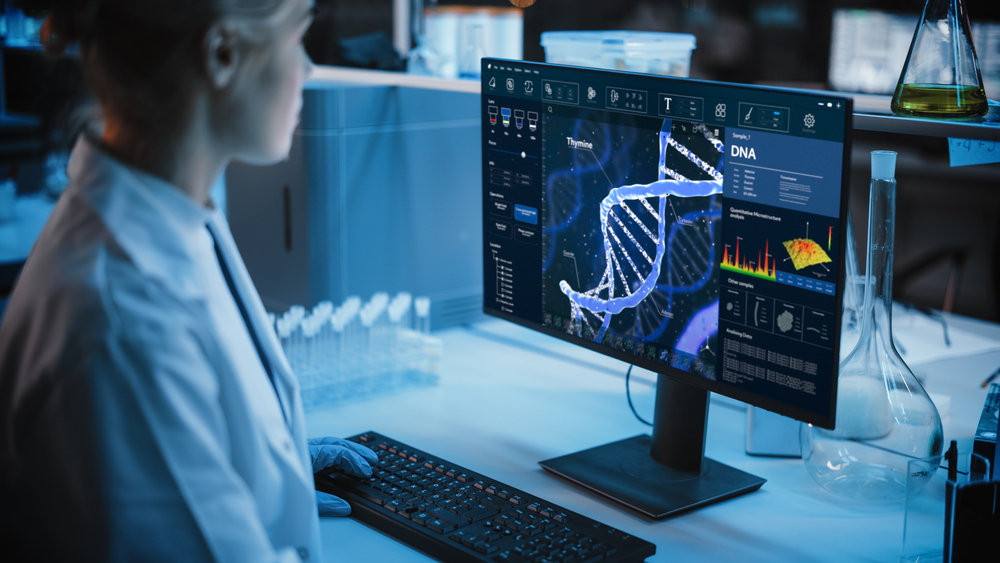
Deep learning in medicine can help facilitate the drug discovery process and generate new chemical structures. Together with other ML-based techniques, it has been used to assess biological activity, absorption, distribution, metabolism, and excretion (ADME) characteristics and select molecules with desirable biological activity and physicochemical properties.
A good example of this use case of ML in healthcare is the program druGAN. It is intended to generate new molecular fingerprints and drug designs incorporating necessary features based on predefined anticancer drug properties. It has already shown a tangible improvement in developing new drug designs with specific properties.
Clinical trials
Machine learning can improve and simplify not only a drug development process but also clinical trials. There are a lot of challenges pharmaceutical businesses face in this area. Organizing clinical trials has traditionally been a time-consuming and lengthy process with a lot of aspects to be considered.
Read also: Developing a Custom Software for the Pharmaceutical Industry
For example.
To get reliable results, potential clinical trial candidates must be thoroughly selected based on a number of criteria (e.g., demographics, previous medical records, specific health conditions, etc.). Also, scientists must constantly monitor and analyze a huge amount of data during the trial to ensure that the drugs are safe and effective.
Applying machine learning can accelerate every stage of clinical trials and improve the accuracy of their results.
For example.
ML algorithms can help scientists choose perfect candidates for trials, analyze the information they provide during a trial in real-time, detect errors in data, and identify unexpected patterns. This can lead to enormous cost savings. But the biggest benefit is that the people who need the drugs that are being tested will be able to receive them faster.
Robotic surgery
It’s currently too early to talk about surgeries solely performed by robots, but they can greatly assist doctors in manipulating surgical devices and performing certain tasks. Machine learning has been successfully used in areas like suturing automation, evaluating surgical skills, and improving robotic surgical materials and their workflow modeling.
For instance, the smart tissue autonomous robot (STAR) from Johns Hopkins University has already demonstrated that it can outperform human surgeons in some surgical procedures such as suturing and knot-tying.
Personalized treatment
Machine learning can help shift the focus in healthcare from a reactive to a preventive mode by providing personalized treatment plans. Being capable of identifying hidden patterns of data, ML algorithms can work around the clock and flag patients who may have health problems.
What’s more,
Computer vision in healthcare applications can help doctors deliver highly personalized care based on individual patient characteristics and symptoms. This, in turn, will help lower the chances of patients suffering side effects from prescribed medicine.
For instance, IBM Watson Oncology already uses machine learning to analyze a patient’s medical history and provide them with tailored treatment plans. This approach allows providers to improve the quality of personalized healthcare.
First responder in epidemics
The use of machine learning algorithms in healthcare can help predict and track epidemic outbreaks. But that’s not the only benefit. ML can also help decrease poor epidemic outcomes by playing the role of the first responder.
For example,
ML-based chatbots can help sort out the patients into risk groups based on the symptoms they indicate and even suggest diagnoses for the doctors to review and make decisions.
ML assistance can thus help healthcare professionals focus their time where it is most needed. Such a combination of human intelligence with the thoroughness of machine learning systems could be the best shot we have in case of future epidemics.
Patient engagement
Machine learning can improve the treatment process by increasing patient involvement and so bringing about better health outcomes. Combined with the Internet of Medical Things, ML can get more precise patient data and automate messaging alerts that trigger patient’s actions at specific moments.
For instance, one successful use case is wearable non-invasive sensors that allow for continuous and convenient glucose monitoring for diabetes patients. Integration with ML can help notify patients when they need to take another insulin dose. In this way, ML can improve patient engagement, which naturally leads to the improvement of the overall treatment process.
These are only a few examples of harnessing the power of ML in the medical domain. Machine learning in the healthcare system has tremendous potential, yet certain challenges hinder its wide adoption. Let’s take a closer look to learn more.
Read also: Emerging trends in healthcare technologies.
Challenges for ML in healthcare
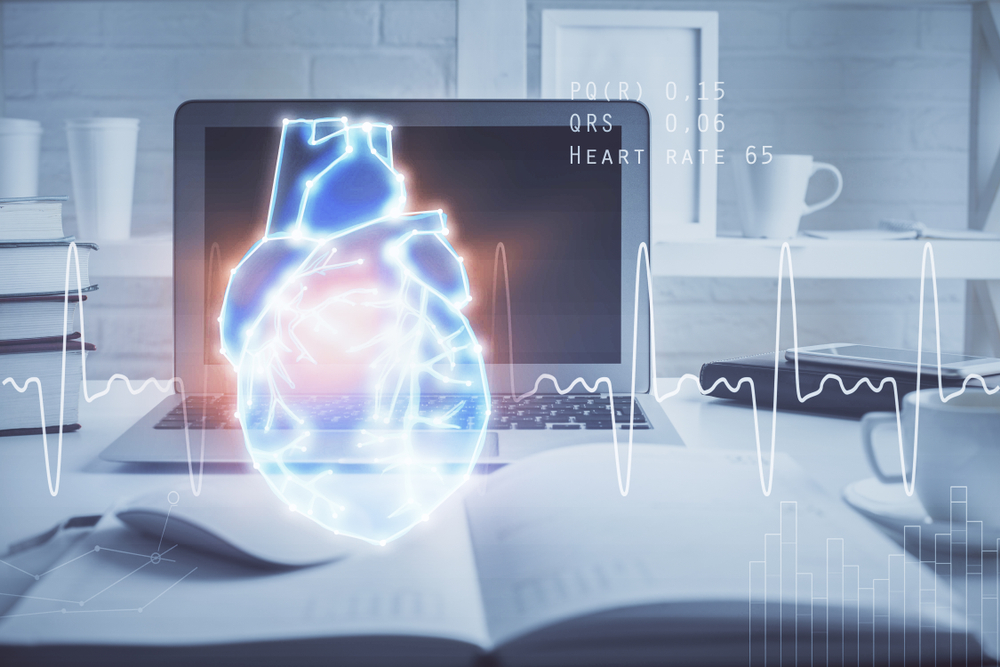
Machine learning has proven to be quite useful in a number of cases. Yet, wide adoption will require a lot of effort. Let's examine the roadblocks standing in the way of the global adoption of ML in healthcare.
Heterogeneity of data
The adoption of AI and machine learning can bring substantial improvements to almost any process within the healthcare industry. Yet, to make accurate predictions, ML needs high-quality structured data. Gaps in healthcare information can lead to false predictions and so negatively impact decision-making in clinical settings.
Currently, the heterogeneity of data in healthcare is one bottleneck hindering extensive machine learning adoption. Fragmented, duplicate, and missing data, together with thousands of handwritten document scans, can lead to inadequate insights and drive poor decisions. The data needs to be adequately structured and cleaned first before machine learning algorithms can effectively use it.
Lack of qualified resources
Another barrier standing in the way of machine learning is the shortage of qualified data engineers and modelers. According to an IDC survey conducted in 2020, a lack of qualified specialists is among the top barriers (32% of respondents) holding organizations back from extensive use of AI and ML.
Provider resistance
Yet, the greatest challenge to the wide use of machine learning in healthcare is overcoming provider resistance. To implement machine learning, medical organizations often need to update their legacy systems or replace them with modern ones. This requires resources that can be unavailable, especially during a health crisis like the COVID-19 pandemic.
But despite all these challenges, the future of machine learning in medicine is quite promising. Let’s discuss some predictions about ML in healthcare.
Read also: Medical billing trends to follow.
The future of ML in healthcare

The healthcare industry welcomes the innovations brought by AI and machine learning. In 2020, AI in the global healthcare market has been valued at $6.7 billion and is forecast to grow at a compound annual growth rate of 41.8% from 2021 to 2028.
One of the key factors of projected growth is a large amount of data and a large number of startups in this area. The implementation of machine learning and, specifically, deep learning in healthcare applications for medical imaging, disease identification, and drug discovery is expected to take the lead and drive the growth of the market.
Another important driver for massive ML adoption lies in the cost savings to the healthcare sector. According to Accenture analysis, by 2026, AI applications can potentially cut up to $150 billion of annual US healthcare costs.
But there is also concern about using machine learning applications in medicine. Some market players believe that it may lead to medical staff cuts. Yet, the reality is the complete opposite. Active ML usage will help alleviate overwork among the shrinking healthcare workforce in North American countries by freeing medical staff from routine, mundane tasks.
Wrapping it up
Applications of machine learning in healthcare have a huge potential to change the approach to diagnosing and treating illnesses. This technology is already in active use and shows excellent results in the early diagnosis of breast, skin, and liver cancer. In some areas, like image diagnostics or surgical suturing and knot-tying procedures, ML algorithms already go beyond human capabilities, outperform doctors, and help achieve greater results within a shorter time span.
Thanks to our years of experience in the medical field, Demigos can be your guide to machine learning adoption. Contact us, and we’ll be happy to discuss how we can help you implement your project.

